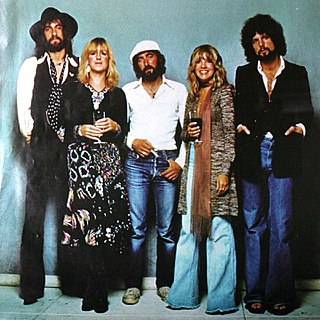
Fleetwood Mac are a British-American rock band, formed in London in 1967. Fleetwood Mac was founded by guitarists and vocalists Peter Green and Jeremy Spencer and drummer Mick Fleetwood. Bob Brunning was hired as a temporary bass guitarist before John McVie joined the line-up in time for their eponymous debut album. Danny Kirwan joined as a third guitarist and vocalist in 1968. Keyboardist and vocalist Christine Perfect, who contributed as a session musician starting with the band's second album, married McVie and joined Fleetwood Mac as a full member in 1970, becoming known as Christine McVie.

The Eagles are an American rock band formed in Los Angeles in 1971. With five number-one singles and six number-one albums, six Grammy Awards and five American Music Awards, the Eagles were one of the most successful musical acts of the 1970s in North America. Founding members Glenn Frey, Don Henley, Bernie Leadon, and Randy Meisner were recruited by Linda Ronstadt as band members, some touring with her, and all playing on her third solo album, before venturing out on their own on David Geffen's new Asylum Records label.

Peter Kenneth Frampton is an English-American guitarist, singer and songwriter who rose to prominence as a member of the rock bands the Herd and Humble Pie. Later in his career Frampton found success as a solo artist. He has released several albums, including his breakthrough album, the live release Frampton Comes Alive! (1976), which spawned several hit singles and has earned 8× Platinum by the RIAA in the United States. He has also worked with acts such as Ringo Starr, the Who's John Entwistle, David Bowie, and both Matt Cameron and Mike McCready of Pearl Jam.

Robert Steven "Adrian" Belew is an American musician, singer, songwriter, and record producer. A multi-instrumentalist primarily known as a guitarist and singer, he is noted for his unusual and impressionistic approach to his guitar tones.

Joseph Fidler Walsh is an American guitarist, singer, and songwriter. Best known as a member of the rock band the Eagles, his five-decade career has also included solo work and stints in two other successful rock bands: James Gang and Ringo Starr & His All-Starr Band. He was also part of the New Zealand band Herbs. In the 1990s, he was a member of the short-lived supergroup The Best.
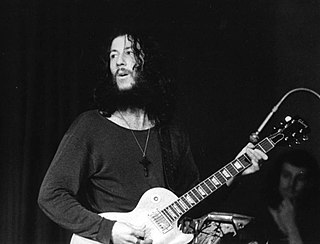
Peter Allen Greenbaum, known professionally as Peter Green, was an English blues rock singer-songwriter and guitarist. As the founder of Fleetwood Mac, he was inducted into the Rock and Roll Hall of Fame in 1998. Green founded Fleetwood Mac in 1967 after a stint in John Mayall's Bluesbreakers and quickly established the new band as a popular live act in addition to a successful recording act, before departing in 1970. Green's songs, such as "Albatross", "Black Magic Woman", "Oh Well", "The Green Manalishi " and "Man of the World", appeared on singles charts, and several have been adapted by a variety of musicians.
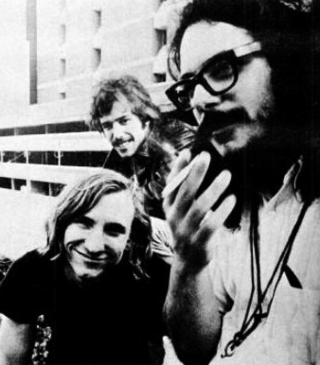
James Gang was an American rock band formed in Cleveland, Ohio, in 1966. The band went through a variety of line-up changes until they recorded their first album as a power trio consisting of Joe Walsh, Tom Kriss (bass), and Jim Fox (drums). Dale Peters replaced Kriss on bass for the band's second and third albums. Two of the band's songs, "Funk #49" and "Walk Away", continue to be popular on classic rock and AOR stations.

David Thomas Mason is an English singer-songwriter and guitarist from Worcester, who first found fame with the rock band Traffic. Over the course of his career, Mason has played and recorded with many notable pop and rock musicians, including Paul McCartney, George Harrison, the Rolling Stones, Jimi Hendrix, Eric Clapton, Michael Jackson, David Crosby, Graham Nash, Steve Winwood, Fleetwood Mac, Delaney & Bonnie, Leon Russell, and Cass Elliot. One of Mason's best known songs is "Feelin' Alright", recorded by Traffic in 1968 and later by many other performers, including Joe Cocker, whose version of the song was a hit in 1969. For Traffic, he also wrote "Hole in My Shoe", a psychedelic pop song that became a hit in its own right. "We Just Disagree", Mason's 1977 solo U.S. hit, written by Jim Krueger, has become a staple of U.S. classic hits and adult contemporary radio playlists.
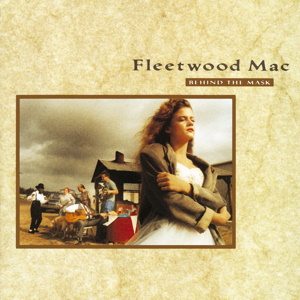
Behind the Mask is the fifteenth studio album by British-American rock band Fleetwood Mac, released on 9 April 1990. It was the first album released by the band after the departure of guitarist Lindsey Buckingham. He was replaced by Billy Burnette and Rick Vito, both guitar players, singers and songwriters. Fleetwood Mac thus became a six-piece band with four singer/songwriters. The album was not as successful as its predecessor, Tango in the Night, nor did it spawn any big hit singles, although "Save Me" made both American and Canadian Top 40, while "Love Is Dangerous" and "Skies the Limit" enjoyed some airplay. Though Behind the Mask barely reached the US Top 20, the album entered the UK Albums Chart at number 1 and achieved platinum status there. Following the album's release and subsequent world tour, band members Stevie Nicks and Rick Vito left the band, though Nicks would rejoin in 1997.

Bernard Matthew Leadon III is an American singer, musician, songwriter and founding member of the Eagles, for which he was inducted into the Rock and Roll Hall of Fame in 1998. Prior to the Eagles, he was a member of three country rock bands: Hearts & Flowers, Dillard & Clark, and the Flying Burrito Brothers. He is a multi-instrumentalist coming from a bluegrass background. He introduced elements of this music to a mainstream audience during his tenure with the Eagles.

Tin Machine were a British–American rock band formed in 1988, and fronted by English singer-songwriter David Bowie. The band consisted of Bowie on lead vocals, saxophone and guitar; Reeves Gabrels on guitar and vocals; Tony Fox Sales on bass and vocals; and Hunt Sales on drums and vocals. The Sales brothers had previously performed with Bowie and Iggy Pop during the 1977 tour for The Idiot. Kevin Armstrong played additional guitar and keyboards on the band's first and second studio albums and first tour, and American guitarist Eric Schermerhorn played on the second tour and live album Tin Machine Live: Oy Vey, Baby (1992).

The Anthology... So Far is a triple live compilation album by English rock musician Ringo Starr and his All Starr Band. It was released in the United Kingdom on 5 February 2001 by Eagle Records and on 24 July in the United States by Koch Records. The album includes material from 1990's Ringo Starr and His All-Starr Band, 1993's Ringo Starr and His All Starr Band Volume 2: Live from Montreux and 1997's Ringo Starr and His Third All-Starr Band Volume 1, along with previously unreleased live recordings from 1995, 1997 and 2000.

Ringo Starr and His All-Starr Band is Ringo Starr's first official live album, and the first album recorded with his All-Starr Band, recorded in 1989 during his successful comeback tour and released in 1990. It was also Starr's first release of unheard material in seven years.

Ringo Starr and His All Starr Band Volume 2: Live from Montreux is Ringo Starr's second official live album and was released in September 1993.

Earl Slick is a guitarist best known for his collaborations with David Bowie, John Lennon, Yoko Ono and Robert Smith. He has also worked with other artists including John Waite, Tim Curry and David Coverdale, in addition to releasing several solo recordings, and two records with Phantom, Rocker & Slick, the band he formed with Slim Jim Phantom & Lee Rocker.

Daniel David Kirwan was a British musician whose greatest success came with his role as guitarist, singer and songwriter with the blues rock band Fleetwood Mac between 1968 and 1972. He released three albums as a solo artist from 1975 to 1979, recorded albums with Otis Spann, Chris Youlden, and Tramp, and worked with his former Fleetwood Mac colleagues Jeremy Spencer and Christine McVie on some of their solo projects. As a member of Fleetwood Mac, he was inducted into the Rock and Roll Hall of Fame in 1998.
The Amazing Kornyfone Record Label (TAKRL) was one of the first bootlegging record labels in America. Kornyfone was based in Southern California in the 1970s. The label released albums from such artists as The Beatles, David Bowie, Bob Dylan, The Grateful Dead, Led Zeppelin, Elton John, Joni Mitchell, Pink Floyd, Genesis, and others. Kornyfone was known for their packaging, with interesting artwork and informative covers.
Dorsey William Burnette III is an American guitarist, singer, and songwriter who was part of the band Fleetwood Mac from 1987 to 1995. Burnette also had a brief career in acting.

Michael William Hugh Vernon is an English music executive studio owner, and record producer from Harrow, Middlesex. He produced albums for British blues artists and groups in the 1960s, working with the Bluesbreakers, David Bowie, Duster Bennett, Savoy Brown, Chicken Shack, Climax Blues Band, Eric Clapton, Fleetwood Mac, Peter Green, Danny Kirwan, John Mayall, Christine McVie and Ten Years After amongst others.
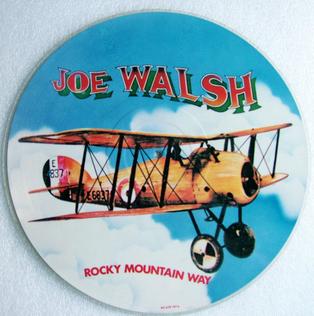
"Rocky Mountain Way" is a 1973 song by rock guitarist Joe Walsh and his band Barnstorm, with writing credits given to all four band members: Walsh, Rocke Grace, Kenny Passarelli, and Joe Vitale. The song was originally released on the album The Smoker You Drink, the Player You Get.

















